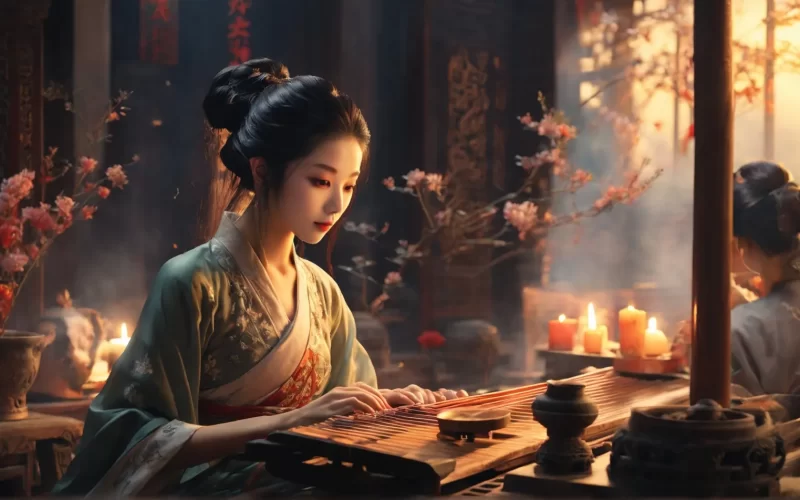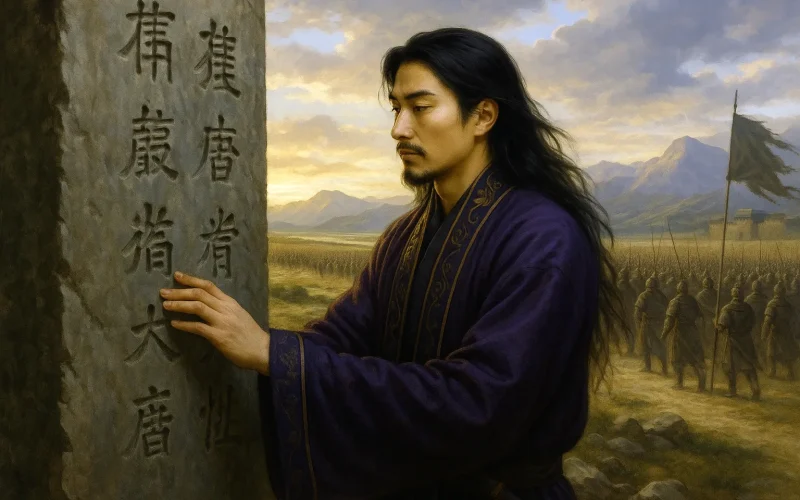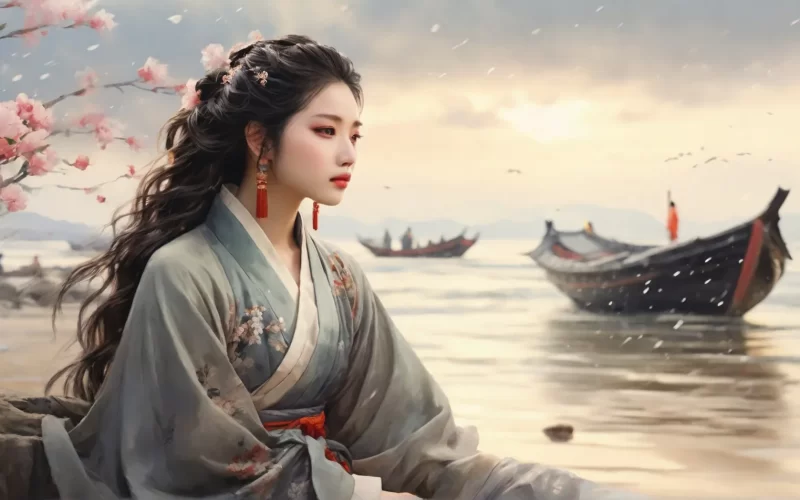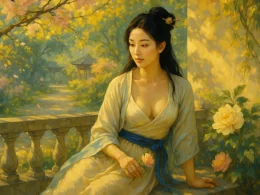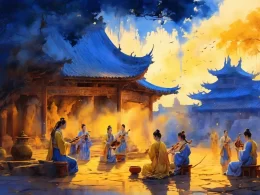When the Emperor sought guidance from wise men, from exiles,
He found no calmer w i sdom than that of young Chia
And assigned him the foremost council-seat at midnight,
Yet asked him about gods, instead of about people.
Original Poem
「听筝」
李端
鸣筝金粟柱,素手玉房前。
欲得周郎顾,时时误拂弦。
Interpretation
This is a delicate lyric poem depicting a maiden's love, composed during the mid-Tang Dynasty. Though merely four lines long, it captures the subtle yet vivacious emotions of a young girl through a single telling detail. The poem conveys a tender, affectionate atmosphere through the zither-playing maiden's demeanor and actions, blending musical beauty with vivid imagery.
First Couplet: « 鸣筝金粟柱,素手玉房前。 »
Míng zhēng jīn sù zhù, sù shǒu yù fáng qián.
Golden millet-wood pegs hum as the zither sings, Fair hands poised before the jade-adorned chamber.
This couplet paints the scene of a maiden playing the zither in an elegant setting. The "golden millet-wood pegs" suggest the instrument's exquisite craftsmanship, while "fair hands" highlight the maiden's grace. The imagery is both visually rich and poetically evocative, immersing readers in the moment. Notably, the poem leaves ambiguous whether she plays alone, creating narrative space for what follows.
Second Couplet: « 欲得周郎顾,时时误拂弦。 »
Yù dé Zhōu láng gù, shí shí wù fú xián.
Hoping for her Zhou Lang's glance, She plucks wrong notes with artful "mistakes."
Here, the core action—"deliberate wrong notes"—reveals the maiden's tender stratagem. "Zhou Lang" alludes to the historical figure Zhou Yu, who would turn his head at musical errors, symbolizing her beloved. The repetition of "shí shí" (时时, "repeatedly") confirms her playful intent, showcasing both her affection and cleverness, infusing the poem with lively charm.
Holistic Appreciation
The poem demonstrates exquisite craftsmanship, centering on a zither-playing maiden whose "accidental plucking of strings" subtly reveals her yearning for love and bashful disposition. Rather than explicit emotional declarations, the poet employs classical allusions and dynamic descriptions to allow the character's feelings to emerge naturally. The allusion to "Zhou Yu's glance" not only enriches the cultural depth but also accentuates the maiden's affection. With her fresh, spirited portrayal and genuine emotions, this romantic vignette unfolds like an ancient courtesan painting, gracefully coming alive before the reader's eyes.
Artistic Merits
The poem features distinctive conception and concise yet profound diction, exemplifying the art of conveying grand themes through subtle details. The poet captures nuanced expressions and psychological fluctuations through the meticulous depiction of "accidental string plucking," achieving remarkable artistic intensity with minimal words. Its limpid language and harmonious cadence blend musicality with vivid imagery, while the restrained emotional expression embodies classical elegance and Eastern subtlety. Like a vivid stage sketch, the poem showcases the Tang poetic mastery of portraying characters through emotions and conveying meaning through actions.
Insights
Beyond presenting ancient women's delicate yet vivid expressions of love, the poem enlightens us that emotional communication need not rely on elaborate displays—often a single detail or gesture suffices to convey profound sentiment. In our era of rapid rhythms and blunt expressions, this refined, graceful approach reminds us that love can also manifest as quiet depths and tender beauty stirring in subtle moments.
Poem translator
Kiang Kanghu
About the poet
Li Duan (李端) was a native of Zhao County, Hebei Province. Li Duan was a native of Zhao County, Hebei Province. He was admitted as a jinshi in 770 AD, and was one of the “Ten Scholarly Men of the Dali Dynasty”. He was one of the “Ten Scholars of the Dali Dynasty”. His poems were often sent as farewells and gifts, and he was highly praised for his quick-wittedness.






